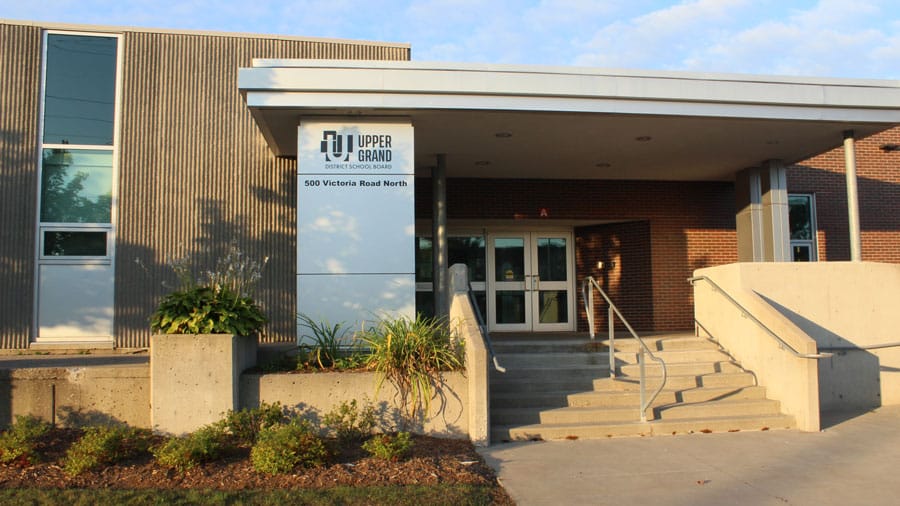GUELPH – Students are concerned about climate change – and it’s important for them to see adults, including school board officials, making efforts to reduce emissions.
That’s the message parents brought to the Upper Grand District School Board (UGDSB) on Oct. 8, along with a petition, signed by hundreds, calling for trustees to “pass a resolution to eliminate fossil fuel heating in all new and existing board facilities to address climate change.”
The petition, which had 776 signatures by Oct. 10, was created by the Fossil Fuel Out of School Guelph campaign.
“This action will set an inspirational example for our students,” it states.
The petition asks for fossil fuel-free heating systems for future and existing schools and board facilities and for a plan with annual, publicly available progress reports.
Delegations
Delegates Sam Stevenson, Samantha Hicks and Kriti Murthy asked trustees to prioritize installing fossil fuel-free systems in the UGDSB schools that do not have any rooms with air conditioning (AC).
These schools include Kenilworth Public School, James McQueen in Fergus, Ross R. MacKay in Hillsburgh and the Akinomaagayegaamikoong Environmental Learning Centre at Island Park in Orangeville, as well as six Guelph elementary schools.
Stevenson thanked trustees for planning to use heat pumps in the new Fergus elementary and south Guelph secondary schools, and said many people who signed the petition were “exceptionally pleased” by this effort to reduce emissions.
“We’re pleased because this is exactly the work needed to preserve a livable planet,” he said.
“Burning fossil fuels is harming families and communities.
“It’s increasing extreme heat, drought, flooding, forest fires and the movement of disease-carrying insects.”
Hicks said the earth is in a “state of emergency” and is “in need of our care.
“One of the ways we can help is transitioning our schools off of fossil fuels and in to heat pumps.”
Stevenson described heat pumps as the “proven alternative to fossil fuel heating,” noting they:
- are up to three times more efficient than gas;
- use electricity only so they have no emissions at the source; and
- can also cool air, reducing the need for separate AC units.
The UGDSB currently uses heat pumps for cooling air in rooms of seven schools, including Victoria Terrace and JD Hogarth public schools in Fergus and John F. Ross Collegiate Vocational Institute in Guelph.
Hicks has two children who go to an UGDSB school without AC, and described the ways students and staff try to find reprieve from the heat.
“Teachers … send messages to parents about sending extra water and ice packs,” she said, noting her children feel dizzy and somewhat faint sometimes while inside their school during hot weather.
“It does not seem like a fair environment to be working in, whether you are a student learning, or a staff member,” Hicks added.
She asked about the board’s plan for the future if temperatures continue to climb.
“I’m asking you today for a commitment and plan to transition our schools away from fossil fuels, and within that plan to prioritize the … schools that are without a cooling system,” she said.

This chart, created by the Fossil Fuel Out of School Guelph team, shows UGDSB buildings’ CO2 emissions since the 2015-16 school year, and the reductions required for the board to be in compliance with the Intergovernmental Panel on Climate Change. The data has been verified by the Wellington Advertiser. (Image from Sam Stevenson delegation)
Students’ concerns
Hicks, a therapist, said young people talk to her about their climate-related stress.
Murthy, whose family is new to Canada, said her children have attended schools in multiple countries and have felt most at home with the UGDSB.
But they’re concerned about climate change, and Murthy urged trustees to consider the message their decisions send to children.
“My fifth grader and her friends are already talking about how burning fossil fuels threatens their winters and how it impacts their health,” she said.
“And I’ve heard them casually wonder about what this means for their future.”
Murthy added, “I think they are really too young to understand the implications – in fact I don’t think I completely understand all of the implications of the changing climate, but I do know that children as young as my 10-year-old are concerned … and I know they are looking at us.”
She said her daughter is excited about the heat pumps planned for the new schools, but asked “what about the others?”
To Murthy, the suggested resolution to phase out fossil fuels is a chance to show students “we take their future seriously.”
Board’s motion
Though the board didn’t pass a resolution to eliminate fossil fuels, trustees did pass a motion related to the delegations and petition.
“I think we all support the delegations’ intentions to move our schools and other buildings away from the use of fossil fuels, and we know that staff has been working really hard on this and making a lot of progress,” said trustee Katherine Hauser.
She noted “funding is always tight,” but suggested a motion directing staff to produce a report on the “feasibility and potential barriers” involved.
Hauser suggested the report be presented to the board’s finances and facilities committee.
Trustee Luke Weiler amended Hauser’s motion to “include a request to develop an overall action plan around sustainability and the climate crisis.”
Weiler said he wants the plan to go beyond reducing and eliminating fossil fuels in buildings, and to include the board’s fleet and “other things like landscape planning … creating outdoor spaces that are sustainable and offer shaded refuge for our students and staff during the worsening heat.
“We’re not talking about this enough.”
He added, “The scale and the scope of the problem is so great that sometimes we are just not sure what to say and we feel like it’s almost too big to do anything about.
“But this is, in my opinion, the single most important issue of all of our lifetimes.”
Weiler echoed Murthy’s sentiment about not understanding all the implications of climate change, noting, “I don’t think any of us do.
“I think this is something that is going to be a continual and very scary unveiling, so I’m really glad [the delegates] came tonight.”
Trustees voted unanimously in support of a motion to ask staff to provide a feasibility study to the finance and facilities committee and to develop an action plan around sustainability and the climate crisis.




